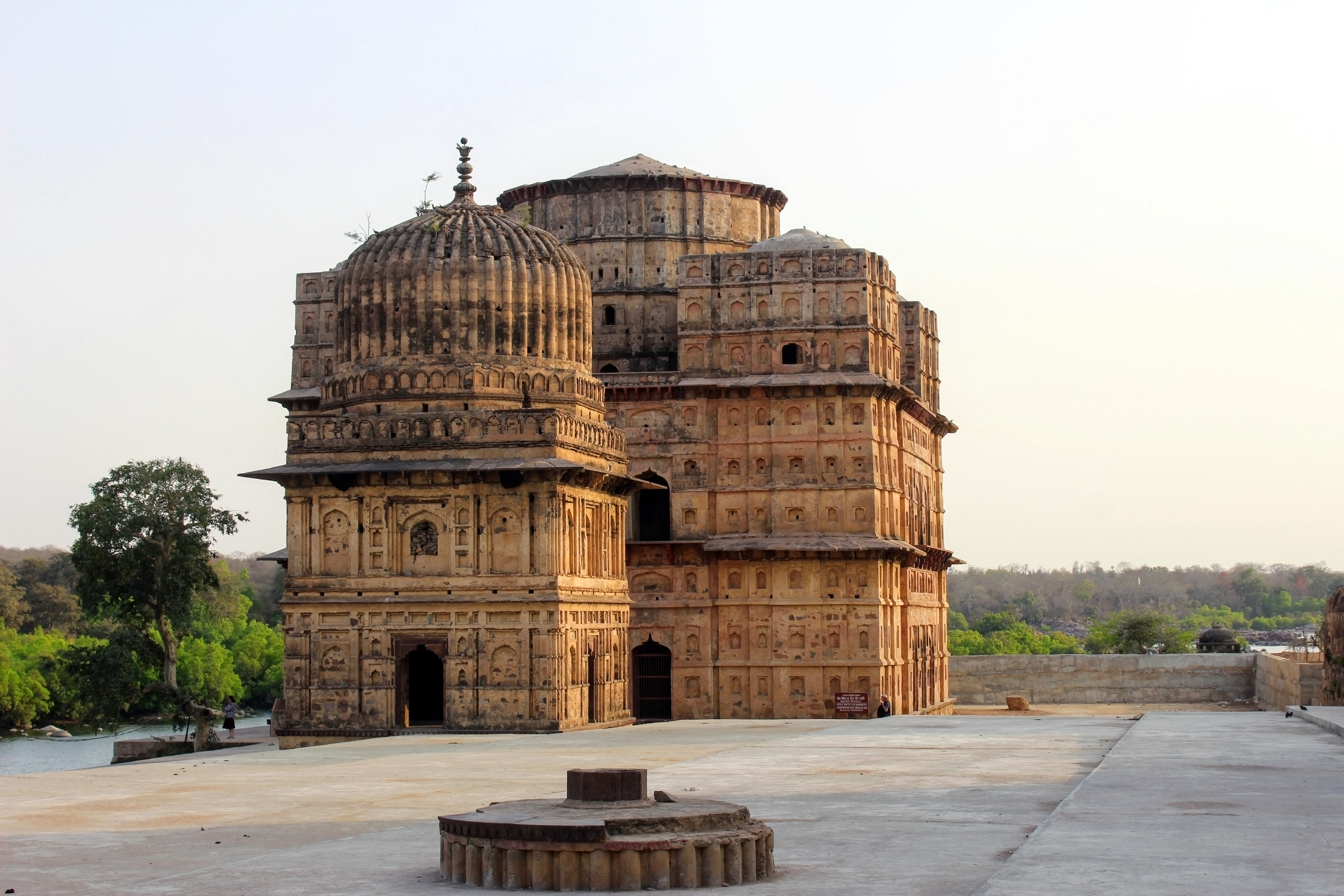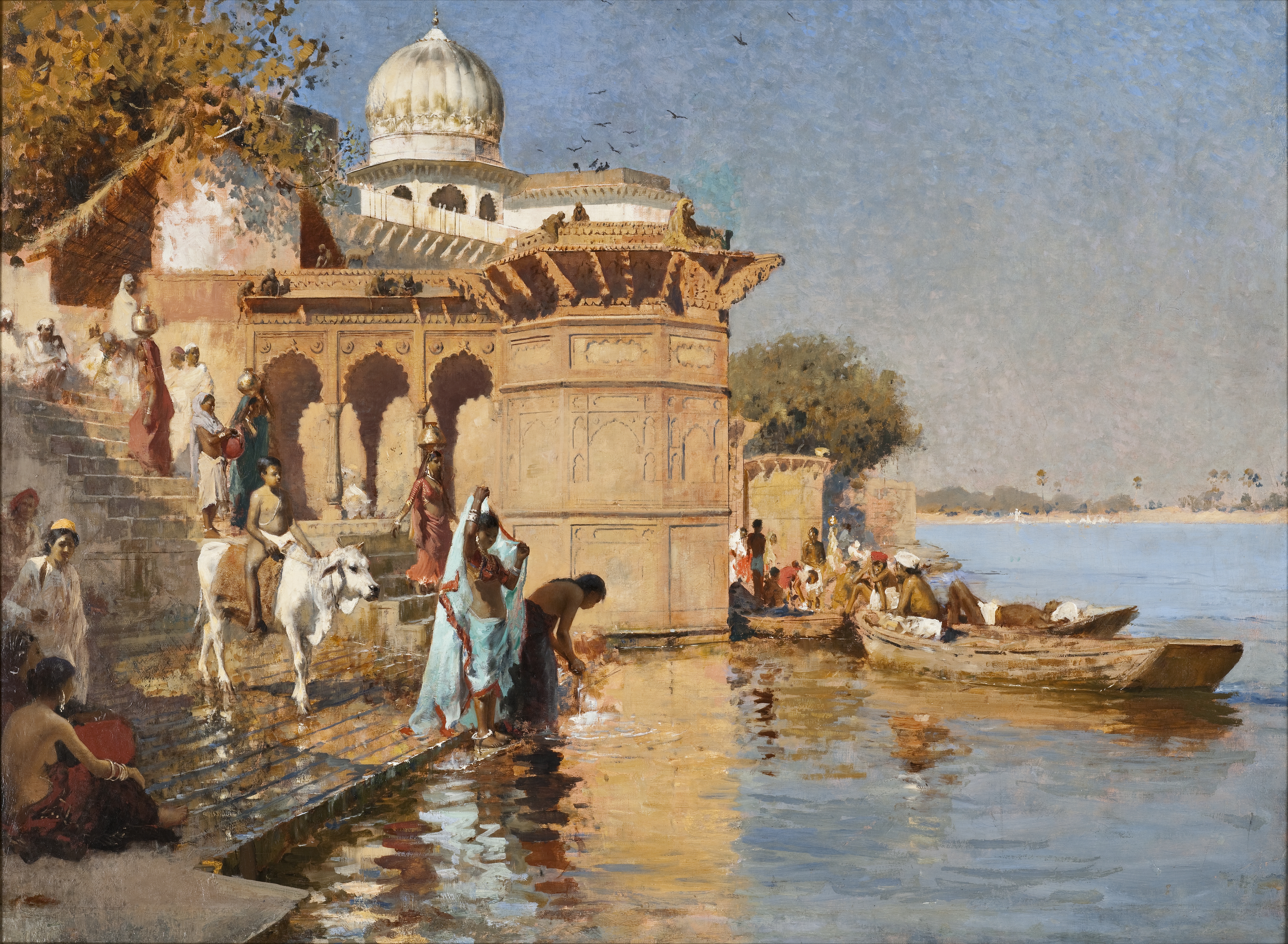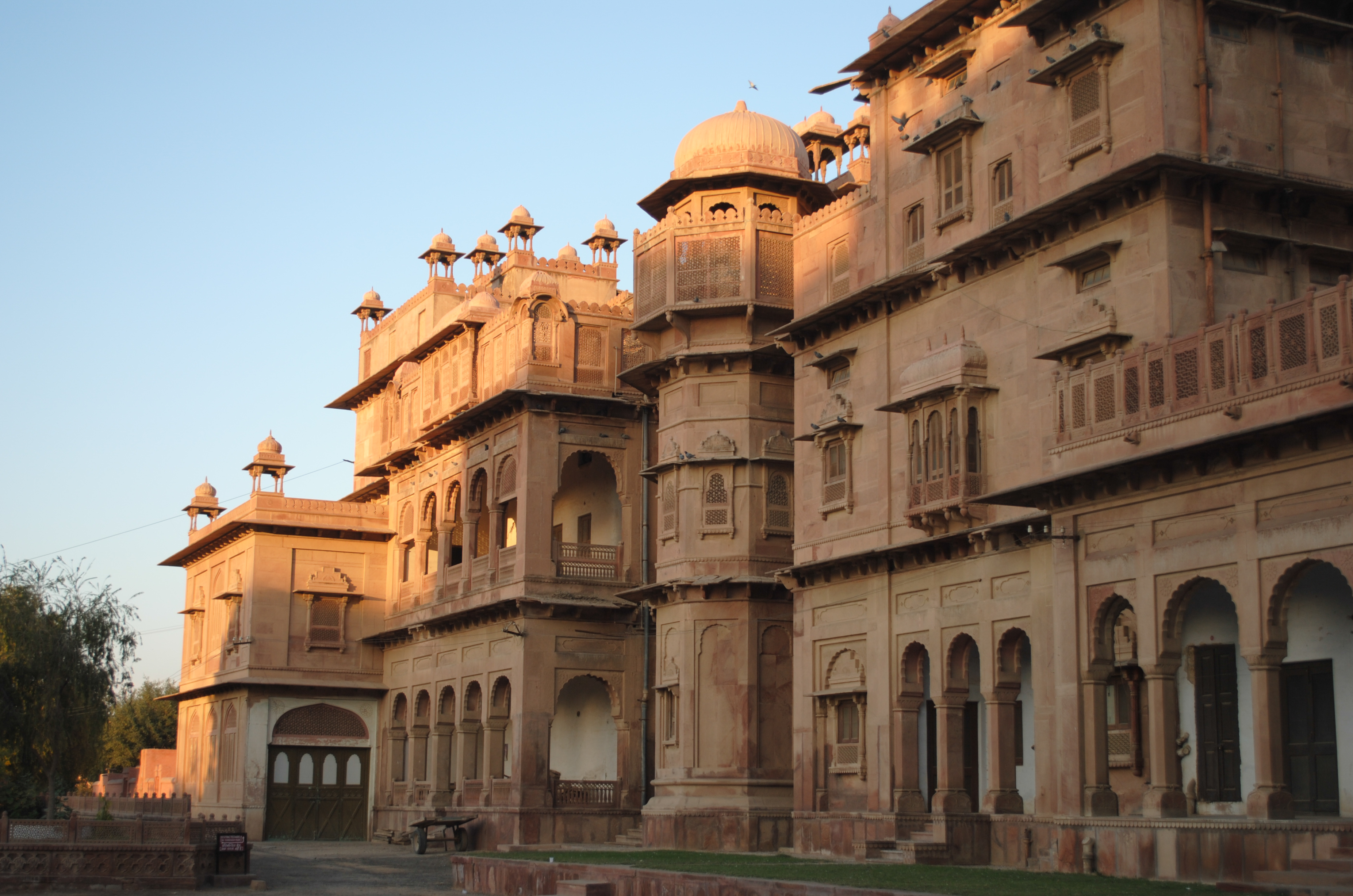|
Vir Singh Deo
Vir Singh Deo, also known as Bir Singh Dev, was a Bundela Rajput chief and the ruler of the kingdom of Orchha. He was a vassal of the Mughal Empire. and ruled between 1605 and either 1626 or 1627. Vir Singh Deo assassinated Abul Fazl who was returning from Deccan in a plot contrived by the Mughal Prince Salim. According to Aruna, he is "the most famous and most powerful of all the Orchha Chiefs. A man of dashing personality, a great warrior and no scruples, a bold and organised administrator". He was considered to built the Jhansi fort Deo was among the Rajput rulers of his era who sponsored temples in the Brajmandal area that comprised Vrindavan and Mathura. In addition, the Phool Bagh gardens, and the Lakshmi temple were all built by Deo. His mausoleum is located in Orchha, and features both Hindu and Mughal architecture. Vir Singh Deo was succeeded by Jhujhar Singh, the first-born son of the senior of his three queens. Deo was patron to the poet Keshavdas Keshavda ... [...More Info...] [...Related Items...] OR: [Wikipedia] [Google] [Baidu] |
Bundela
The Bundela is a Rajput clan. Over several generations, the cadet lineages of Bundela Rajputs founded several states in area what came to be known as Bundelkhand anciently known as Chedi Kingdom from the 16th century. Etymology As per Jaswant Lal Mehta, the word "Bundela" is based on a deity, named Bind-bhasini Devi, who is believed to have her abode on the Bindhachal, the northern most part of the Vindhya ranges. Expansion legends According to Bundela legends, Jagdas' descendant Arjunpal was the ruler of Mahoni. His eldest son Birpal succeeded him as the king of Mahoni, although his younger son Sohanpal was the best warrior. To get his share of the kingdom, Sohanpal sought help from Naga (alias Hurmat Singh), the Khangar ruler of Kurar ( Kundar). Naga demanded a matrimonial alliance in return. When Sohanpal refused, Naga tried to detain him and forcibly agree him to the condition. Sohanpal escaped, and unsuccessfully sought help from the Chauhans, the Salingars, and the ... [...More Info...] [...Related Items...] OR: [Wikipedia] [Google] [Baidu] |
Mathura
Mathura () is a city and the administrative headquarters of Mathura district in the Indian state of Uttar Pradesh. It is located approximately north of Agra, and south-east of Delhi; about from the town of Vrindavan, and from Govardhan. In ancient times, Mathura was an economic hub, located at the junction of important caravan routes. The 2011 Census of India estimated the population of Mathura at 441,894. In Hinduism, Mathura is birthplace of Krishna, which is located at the Krishna Janmasthan Temple Complex. It is one of the Sapta Puri, the seven cities considered holy by Hindus, also called Mokshyadayni Tirth. The Kesava Deo Temple was built in ancient times on the site of Krishna's birthplace (an underground prison). Mathura was the capital of the kingdom of Surasena, ruled by Kansa, the maternal uncle of Krishna. Mathura is part of the Lord Krishna circuit (Mathura,Vrindavan, Barsana, Govardhan, Kurukshetra, Dwarka and Bhalka). Janmashtami is grandly celebrate ... [...More Info...] [...Related Items...] OR: [Wikipedia] [Google] [Baidu] |
Bundelkhand
Bundelkhand (, ) is a geographical and cultural region and a proposed state and also a mountain range in central & North India. The hilly region is now divided between the states of Uttar Pradesh and Madhya Pradesh, with the larger portion lying in the latter state. Jhansi is the largest city in Bundelkhand. Another major city of Bundelkhand is Sagar being second largest city of Bundelkhand and headquarter of Sagar Division. Etymology Bundelkhand means "Bundela domain". The region was earlier known as Jejabhukti or Jejakabhukti ("Jeja's province"). According to the inscriptions of the Chandela dynasty, this name derived from Jeja, the nickname of their ruler Jayashakti. However, it is possible that the name derives from an even earlier name of the region: "Jajhauti" or "Jijhoti". After the Bundelas replaced the Chandelas around 14th century, the region came to be known as Bundelkhand after them. History Under the British Raj, Bundelkhand included the princely states of Or ... [...More Info...] [...Related Items...] OR: [Wikipedia] [Google] [Baidu] |
Rajput Rulers
Rajput (from Sanskrit ''raja-putra'' 'son of a king') is a large multi-component cluster of castes, kin bodies, and local groups, sharing social status and ideology of genealogical descent originating from the Indian subcontinent. The term Rajput covers various patrilineal clans historically associated with warriorhood: several clans claim Rajput status, although not all claims are universally accepted. According to modern scholars, almost all Rajput clans originated from peasant or pastoral communities. Over time, the Rajputs emerged as a social class comprising people from a variety of ethnic and geographical backgrounds. During the 16th and 17th centuries, the membership of this class became largely hereditary, although new claims to Rajput status continued to be made in the later centuries. Several Rajput-ruled kingdoms played a significant role in many regions of central and northern India from seventh century onwards. The Rajput population and the former Rajput states ... [...More Info...] [...Related Items...] OR: [Wikipedia] [Google] [Baidu] |
Mughal Nobility
Mughal or Moghul may refer to: Related to the Mughal Empire * Mughal Empire of South Asia between the 16th and 19th centuries * Mughal dynasty * Mughal emperors * Mughal people, a social group of Central and South Asia * Mughal architecture * Mughlai cuisine * Mughal painting Other uses * Moghulistan in Central Asia ** Moghol people * Moghul, Iran, a village * Mirza Mughal (1817–1857), a Mughal prince * Fiyaz Mughal, founder of Tell MAMA Tell MAMA (Measuring Anti-Muslim Attacks) is a national project which records and measures anti-Muslim incidents in the United Kingdom. It is modelled on the Jewish Community Security Trust (CST) and like the CST it also provides support for vi ... See also * Mogul (other) * Mughal-e-Azam (other) {{disambiguation ... [...More Info...] [...Related Items...] OR: [Wikipedia] [Google] [Baidu] |
Keshavdas
Keshavdas Mishra (1555–1617), usually known by the mononym Keshavdas or Keshavadasa, was a Sanskrit scholar and Hindi poet, best known for his ''Rasik Priya'', a pioneering work of the ''riti kaal'' (procedure period) of Hindi literature. Life Keshavdas Mishra was a Sanadhya Brahman born in 1555 probably near to Orchha at Tikamgarh. There were many pandits among his ancestors and inferences from his writings suggest that, as would be typical of a pandit, the preferred language of his family, and that to which he was exposed as a child, was Sanskrit. Those ancestors included Dinakara Mishra and Tribikrama Mishra, who had both been rewarded by Tomara rulers in Delhi and Gwalior, as well as his grandfather, Krishnadatta Mishra, and his father, Kashinatha Mishra, who had both served as scholars to the rulers of Orchha kingdom. His elder brother, Balabhadra Mishra, was also a poet. Despite the familial connection to Sanskrit, Keshavdas adopted a vernacular style of Hindi, know ... [...More Info...] [...Related Items...] OR: [Wikipedia] [Google] [Baidu] |
Orchha
Orchha is a town, near city of Niwari in Niwari district of Madhya Pradesh state, India. The town was established by rajput ruler Rudra Pratap Singh some time after 1501, as the seat of an eponymous former princely state of covering parts of central & north India, in the Bundelkhand region. Orchha lies on the Betwa River, 80 km from Tikamgarh & 15 km from Jhansi in Uttar Pradesh. It is included in the UNESCO world heritage cities list in 2020. History Orchha was founded in 1531 (the 16th century AD) by the Bundela chief, Rudra Pratap Singh, who became the first King of Orchha, (r. 1501–1531) and also built the Fort of Orchha. The Chaturbhuj Temple was built by the queen of Orchha, Ganesh Kunwar (गणेश कुँवर), while ''Raj Mandir'' was built by 'Raja Madhukar Shah' during his reign, 1554 to 1591. Orchha was captured by imperial forces of the Mughal Army led by Prince Aurangzeb in October 1635. File:Ram Raja Temple, Orchha, Madhya Pradesh, Indi ... [...More Info...] [...Related Items...] OR: [Wikipedia] [Google] [Baidu] |
Mausoleum
A mausoleum is an external free-standing building constructed as a monument enclosing the interment space or burial chamber of a deceased person or people. A mausoleum without the person's remains is called a cenotaph. A mausoleum may be considered a type of tomb, or the tomb may be considered to be within the mausoleum. Overview The word ''mausoleum'' (from Greek μαυσωλείον) derives from the Mausoleum at Halicarnassus (near modern-day Bodrum in Turkey), the grave of King Mausolus, the Persian satrap of Caria, whose large tomb was one of the Seven Wonders of the Ancient World. Historically, mausolea were, and still may be, large and impressive constructions for a deceased leader or other person of importance. However, smaller mausolea soon became popular with the gentry and nobility in many countries. In the Roman Empire, these were often in necropoles or along roadsides: the via Appia Antica retains the ruins of many private mausolea for kilometres outside Rome. Whe ... [...More Info...] [...Related Items...] OR: [Wikipedia] [Google] [Baidu] |
Lakshmi
Lakshmi (; , sometimes spelled Laxmi, ), also known as Shri (, ), is one of the principal goddesses in Hinduism. She is the goddess of wealth, fortune, power, beauty, fertility and prosperity, and associated with ''Maya'' ("Illusion"). Along with Parvati and Saraswati, she forms the Tridevi of Hindu goddesses. Within the goddess-oriented Shaktism, Lakshmi is venerated as the prosperity aspect of the Mother goddess. Lakshmi is both the consort and the divine energy (''shakti'') of the Hindu god Vishnu, the Supreme Being of Vaishnavism; she is also the Supreme Goddess in the sect and assists Vishnu to create, protect, and transform the universe. She is an especially prominent figure in Sri Vaishnavism, in which devotion to Lakshmi is deemed to be crucial to reach Vishnu. Whenever Vishnu descended on the earth as an avatar, Lakshmi accompanied him as consort, for example, as Sita and Radha or Rukmini as consorts of Vishnu's avatars Rama and Krishna, respectively. The eight ... [...More Info...] [...Related Items...] OR: [Wikipedia] [Google] [Baidu] |
Phool Bagh Gardens
Phool may refer to: * ''Phool'' (1945 film), a Bollywood film * ''Phool'' (1993 film), a Bollywood film directed by Singeetam Srinivasa Rao * ''Phool'' (magazine), an Urdu-language Pakistani children's magazine See also * * {{disambiguation ... [...More Info...] [...Related Items...] OR: [Wikipedia] [Google] [Baidu] |
Vrindavan
Vrindavan (; ), also spelt Vrindaban and Brindaban, is a historical city in the Mathura district of Uttar Pradesh, India. It is located in the Braj Bhoomi region and holds religious importance in Hinduism as Krishna spent most of his childhood days in this city. Vrindavan has about 5,500 temples dedicated to the worship of Krishna and his divine consort Radha. It is one of the most sacred places for Vaishnavism tradition. Vrindavan is a significant part of the "Krishna pilgrimage circuit" which also includes Mathura, Barsana, Gokul, Govardhan, Kurukshetra, Dwarka and Puri. Etymology The ancient Sanskrit name of the city, (), comes from its groves of ''vṛndā'' (Holy basil) and ''vana'' (a grove or forest). Geography Vrindavan is located at . It has an average elevation of 170 metres (557 feet). Yamuna river flows through the city. It is located 125 km away from Delhi and 15 km away from Mathura City. Climate Demographics As of 2011 In ... [...More Info...] [...Related Items...] OR: [Wikipedia] [Google] [Baidu] |





.jpg)
.jpeg/1200px-Taj_Mahal_(Edited).jpeg)